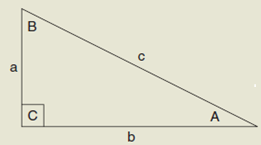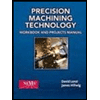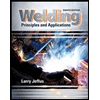
Precision Machining Technology
3rd Edition
ISBN: 9781337795302
Author: Peter, Hoffman.
Publisher: Cengage Learning,
expand_more
expand_more
format_list_bulleted
Concept explainers
Textbook Question
Chapter 2.2, Problem 11RQ
Label the hypotenuse, adjacent side, and opposite side of the given triangle as related to angle A.

Expert Solution & Answer
Want to see the full answer?
Check out a sample textbook solution
Students have asked these similar questions
Problem (17): water flowing in an open channel of a rectangular cross-section with width (b) transitions from a
mild slope to a steep slope (i.e., from subcritical to supercritical flow) with normal water depths of (y₁) and
(y2), respectively.
Given the values of y₁ [m], y₂ [m], and b [m], calculate the discharge in the channel (Q) in [Lit/s].
Givens:
y1 = 4.112 m
y2 =
0.387 m
b = 0.942 m
Answers:
( 1 ) 1880.186 lit/s
( 2 ) 4042.945 lit/s
( 3 ) 2553.11 lit/s
( 4 ) 3130.448 lit/s
Problem (14): A pump is being used to lift water from an underground
tank through a pipe of diameter (d) at discharge (Q). The total head
loss until the pump entrance can be calculated as (h₁ = K[V²/2g]), h
where (V) is the flow velocity in the pipe. The elevation difference
between the pump and tank surface is (h).
Given the values of h [cm], d [cm], and K [-], calculate the maximum
discharge Q [Lit/s] beyond which cavitation would take place at the
pump entrance. Assume Turbulent flow conditions.
Givens:
h = 120.31 cm
d = 14.455 cm
K = 8.976
Q
Answers:
(1) 94.917 lit/s
(2) 49.048 lit/s
( 3 ) 80.722 lit/s
68.588 lit/s
4
Problem (13): A pump is being used to lift water from the bottom
tank to the top tank in a galvanized iron pipe at a discharge (Q).
The length and diameter of the pipe section from the bottom tank
to the pump are (L₁) and (d₁), respectively. The length and
diameter of the pipe section from the pump to the top tank are
(L2) and (d2), respectively.
Given the values of Q [L/s], L₁ [m], d₁ [m], L₂ [m], d₂ [m],
calculate total head loss due to friction (i.e., major loss) in the
pipe (hmajor-loss) in [cm].
Givens:
L₁,d₁
Pump
L₂,d2
오
0.533 lit/s
L1 =
6920.729 m
d1 =
1.065 m
L2 =
70.946 m
d2
0.072 m
Answers:
(1)
3.069 cm
(2) 3.914 cm
( 3 ) 2.519 cm
( 4 ) 1.855 cm
TABLE 8.1
Equivalent Roughness for New Pipes
Pipe
Riveted steel
Concrete
Wood stave
Cast iron
Galvanized iron
Equivalent Roughness, &
Feet
Millimeters
0.003-0.03 0.9-9.0
0.001-0.01 0.3-3.0
0.0006-0.003 0.18-0.9
0.00085
0.26
0.0005
0.15
0.045
0.000005
0.0015
0.0 (smooth) 0.0 (smooth)
Commercial steel or wrought iron 0.00015
Drawn…
Chapter 2 Solutions
Precision Machining Technology
Ch. 2.1 - Briefly describe what you believe are the two most...Ch. 2.1 - Briefly describe what you believe are the two most...Ch. 2.1 - What should be done in the case of a personal...Ch. 2.1 - What does OSHA stand for and what is OSHA's...Ch. 2.1 - List three specific clothing items that should not...Ch. 2.1 - If someone working around machinery has long hair,...Ch. 2.1 - Never operate machinery without proper ______ in...Ch. 2.1 - What is PPE?Ch. 2.1 - What is the most common and important piece of PPE...Ch. 2.1 - What does HCS stand for?
Ch. 2.1 - What does GHS stand for?Ch. 2.1 - What is a pictogram?Ch. 2.1 - What does NFPA stand for?Ch. 2.1 - What does HMIS stand for?Ch. 2.1 - Prob. 15RQCh. 2.1 - Prob. 16RQCh. 2.1 - Class A fire extinguishers use ______ as a media...Ch. 2.1 - What class of fire extinguisher should be used on...Ch. 2.1 - What class of fire extinguisher should be used on...Ch. 2.1 - What is the purpose of lockout and tagout...Ch. 2.2 - What is the inch equivalent of 1 millimeter?Ch. 2.2 - What is the inch equivalent of 32.5 mm to the...Ch. 2.2 - Use the decimal equivalent chart on page 69 to...Ch. 2.2 - Use the decimal equivalent chart on page 69 to...Ch. 2.2 - Use the decimal equivalent chart on page 69 to...Ch. 2.2 - What does parallel mean?Ch. 2.2 - What does perpendicular mean?Ch. 2.2 - What is the radius of a 3.65-inch-diameter circle?Ch. 2.2 - What is the circumference of the circle in the...Ch. 2.2 - What are the Cartesian coordinates of the four...Ch. 2.2 - Label the hypotenuse, adjacent side, and opposite...Ch. 2.3 - Define semi-precision measurement.Ch. 2.3 - What is comparison measurement?Ch. 2.3 - List three rules to follow when or storing...Ch. 2.3 - List the parts of the combination set.Ch. 2.3 - Describe four uses of the combination set.Ch. 2.3 - What semi-precision tool is used to take angular...Ch. 2.3 - What type of square has a blade that can be tilted...Ch. 2.3 - Identify the following tools.Ch. 2.4 - List three key points in caring for precision...Ch. 2.4 - What type of fixed gage can be used to check hole...Ch. 2.4 - What type of fixed gage can be used to check a...Ch. 2.4 - How is the go member of a go/no-go ring gage set...Ch. 2.4 - What type of fixed gage can be used to check...Ch. 2.4 - A _____________ can provide a reference plane for...Ch. 2.4 - What two other tools could be used with the answer...Ch. 2.4 - ___________ is the process of attaching gage...Ch. 2.4 - What is the smallest graduation on an English...Ch. 2.4 - What is the smallest graduation on a metric...Ch. 2.4 - A micrometer uses an accurate __________ to...Ch. 2.4 - What is the smallest graduation on an inch...Ch. 2.4 - What is the smallest graduation on a metric...Ch. 2.4 - What is calibration and why is it important?Ch. 2.4 - What is a transfer-type measuring tool?Ch. 2.4 - What are the two basic types of indicator...Ch. 2.4 - Briefly describe the main difference between the...Ch. 2.4 - A sine tool uses the trigonometric function of...Ch. 2.4 - List the two most common methods for measuring...Ch. 2.4 - What are one advantage and one disadvantage of...Ch. 2.4 - A(n) ________ displays a magnified image of a part...Ch. 2.4 - What other tool can be useful for measuring very...Ch. 2.4 - What does CMM stand for?Ch. 2.5 - What are the four basic parts of a process plan?Ch. 2.5 - Briefly define quality control and explain its...Ch. 2.5 - Briefly explain the purpose of a sampling plan.Ch. 2.5 - What is the purpose of an inspection plan?Ch. 2.5 - What is the important factor to consider when...Ch. 2.5 - What does SPC stand for?Ch. 2.5 - What does an X-bar chart track?Ch. 2.5 - What does an R-chart track?Ch. 2.5 - If an X-bar chart graph is between LCL and the...Ch. 2.5 - If an X-bar chart graph falls below the LCL or...Ch. 2.6 - What is the difference between ferrous and...Ch. 2.6 - Briefly describe an alloy.Ch. 2.6 - Name three alloying elements added to steel.Ch. 2.6 - What is cast iron?Ch. 2.6 - What element is in stainless steel that makes it...Ch. 2.6 - Small particles of________ alloys are flammable.Ch. 2.6 - What are the two major benefits of titanium?Ch. 2.6 - What does AISI stand for?Ch. 2.6 - What does SAE stand for?Ch. 2.6 - What is (are) the major alloying element(s) in...Ch. 2.6 - What is (are) the major alloying element(s) in...Ch. 2.6 - What does IADS stand for?Ch. 2.6 - What is the overall purity of 1030 aluminum?Ch. 2.6 - What is (are) the major alloying element(s) of...Ch. 2.6 - What does UNS stand for?Ch. 2.7 - Briefly define the term heat treatment.Ch. 2.7 - Direct hardening can be performed on steel...Ch. 2.7 - ________ is the rapid cooling of metal during heat...Ch. 2.7 - What type of hardening operation that leaves the...Ch. 2.7 - In what two ways can the process described in the...Ch. 2.7 - What method is used to harden low-carbon steels?Ch. 2.7 - List two methods of performing the operation...Ch. 2.7 - After hardening, steel is very hard and brittle....Ch. 2.7 - Briefly define annealing.Ch. 2.7 - Prob. 10RQCh. 2.7 - A dual-chamber furnace allows the user...Ch. 2.7 - In addition to standard PPE, what specific PPE and...Ch. 2.7 - What hardness testing scale uses many different...Ch. 2.7 - What is a Brale penetrator and what hardness scale...Ch. 2.8 - Why is a routine maintenance plan important?Ch. 2.8 - What is a lubricant?Ch. 2.8 - List three methods of applying lubricants to...Ch. 2.8 - List two components of machine tools that should...Ch. 2.8 - Briefly describe a gib.Ch. 2.8 - What are the purposes of cutting fluids?Ch. 2.8 - What are the two major types of cutting fluids?Ch. 2.8 - Prob. 8RQCh. 2.8 - What two ingredients are often used as additives...Ch. 2.8 - Oils that can be combined with water are...Ch. 2.8 - What is the major benefit of cutting fluids that...Ch. 2.8 - What is the difference between synthetic and...Ch. 2.8 - A______ can be used to measure cutting fluid...Ch. 2.8 - List three methods of applying cutting fluids.Ch. 2.8 - Always review the________ before using any...Ch. 2.8 - What type of cutting fluids should never be used...
Knowledge Booster
Learn more about
Need a deep-dive on the concept behind this application? Look no further. Learn more about this topic, mechanical-engineering and related others by exploring similar questions and additional content below.Similar questions
- The flow rate is 12.275 Liters/s and the diameter is 6.266 cm.arrow_forwardAn experimental setup is being built to study the flow in a large water main (i.e., a large pipe). The water main is expected to convey a discharge (Qp). The experimental tube will be built at a length scale of 1/20 of the actual water main. After building the experimental setup, the pressure drop per unit length in the model tube (APm/Lm) is measured. Problem (20): Given the value of APm/Lm [kPa/m], and assuming pressure coefficient similitude, calculate the drop in the pressure per unit length of the water main (APP/Lp) in [Pa/m]. Givens: AP M/L m = 590.637 kPa/m meen Answers: ( 1 ) 59.369 Pa/m ( 2 ) 73.83 Pa/m (3) 95.443 Pa/m ( 4 ) 44.444 Pa/m *******arrow_forwardFind the reaction force in y if Ain = 0.169 m^2, Aout = 0.143 m^2, p_in = 0.552 atm, Q = 0.367 m^3/s, α = 31.72 degrees. The pipe is flat on the ground so do not factor in weight of the pipe and fluid.arrow_forward
- Find the reaction force in x if Ain = 0.301 m^2, Aout = 0.177 m^2, p_in = 1.338 atm, Q = 0.669 m^3/s, and α = 37.183 degreesarrow_forwardProblem 5: Three-Force Equilibrium A structural connection at point O is in equilibrium under the action of three forces. • • . Member A applies a force of 9 kN vertically upward along the y-axis. Member B applies an unknown force F at the angle shown. Member C applies an unknown force T along its length at an angle shown. Determine the magnitudes of forces F and T required for equilibrium, assuming 0 = 90° y 9 kN Aarrow_forwardProblem 19: Determine the force in members HG, HE, and DE of the truss, and state if the members are in tension or compression. 4 ft K J I H G B C D E F -3 ft -3 ft 3 ft 3 ft 3 ft- 1500 lb 1500 lb 1500 lb 1500 lb 1500 lbarrow_forward
- Problem 14: Determine the reactions at the pin A, and the tension in cord. Neglect the thickness of the beam. F1=26kN F2 13 12 80° -2m 3marrow_forwardProblem 22: Determine the force in members GF, FC, and CD of the bridge truss and state if the members are in tension or compression. F 15 ft B D -40 ft 40 ft -40 ft 40 ft- 5 k 10 k 15 k 30 ft Earrow_forwardProblem 20: Determine the force in members BC, HC, and HG. After the truss is sectioned use a single equation of equilibrium for the calculation of each force. State if the members are in tension or compression. 5 kN 4 kN 4 kN 3 kN 2 kN B D E F 3 m -5 m- -5 m- 5 m 5 m-arrow_forward
- An experimental setup is being built to study the flow in a large water main (i.e., a large pipe). The water main is expected to convey a discharge (Qp). The experimental tube will be built at a length scale of 1/20 of the actual water main. After building the experimental setup, the pressure drop per unit length in the model tube (APm/Lm) is measured. Problem (19): Given the value of Qp [m³/s], and assuming Reynolds number similitude between the water main and experimental tube, calculate the flow rate in the model tube (Qm) in [lit/s]. = 30.015 m^3/sarrow_forwardProblem 11: The lamp has a weight of 15 lb and is supported by the six cords connected together as shown. Determine the tension in each cord and the angle 0 for equilibrium. Cord BC is horizontal. E 30° B 60° Aarrow_forwardProblem 10: If the bucket weighs 50 lb, determine the tension developed in each of the wires. B $30° 5 E D 130°arrow_forward
arrow_back_ios
SEE MORE QUESTIONS
arrow_forward_ios
Recommended textbooks for you
 Precision Machining Technology (MindTap Course Li...Mechanical EngineeringISBN:9781285444543Author:Peter J. Hoffman, Eric S. Hopewell, Brian JanesPublisher:Cengage Learning
Precision Machining Technology (MindTap Course Li...Mechanical EngineeringISBN:9781285444543Author:Peter J. Hoffman, Eric S. Hopewell, Brian JanesPublisher:Cengage Learning Welding: Principles and Applications (MindTap Cou...Mechanical EngineeringISBN:9781305494695Author:Larry JeffusPublisher:Cengage Learning
Welding: Principles and Applications (MindTap Cou...Mechanical EngineeringISBN:9781305494695Author:Larry JeffusPublisher:Cengage Learning International Edition---engineering Mechanics: St...Mechanical EngineeringISBN:9781305501607Author:Andrew Pytel And Jaan KiusalaasPublisher:CENGAGE L
International Edition---engineering Mechanics: St...Mechanical EngineeringISBN:9781305501607Author:Andrew Pytel And Jaan KiusalaasPublisher:CENGAGE L

Precision Machining Technology (MindTap Course Li...
Mechanical Engineering
ISBN:9781285444543
Author:Peter J. Hoffman, Eric S. Hopewell, Brian Janes
Publisher:Cengage Learning

Welding: Principles and Applications (MindTap Cou...
Mechanical Engineering
ISBN:9781305494695
Author:Larry Jeffus
Publisher:Cengage Learning

International Edition---engineering Mechanics: St...
Mechanical Engineering
ISBN:9781305501607
Author:Andrew Pytel And Jaan Kiusalaas
Publisher:CENGAGE L
Understanding Thermal Radiation; Author: The Efficient Engineer;https://www.youtube.com/watch?v=FDmYCI_xYlA;License: Standard youtube license